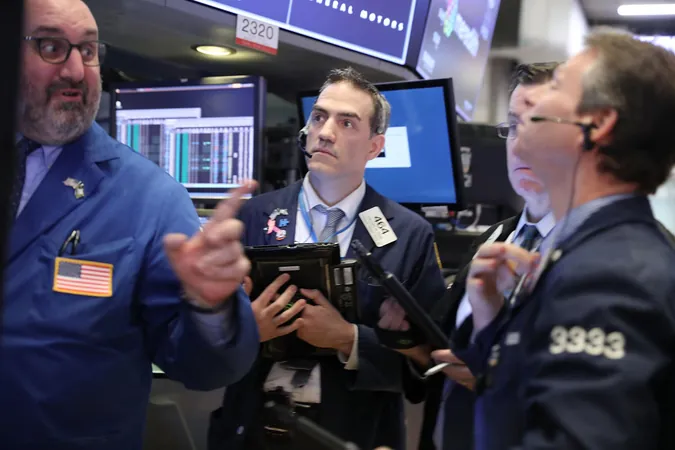
Stock Market Turmoil: S&P 500, Nasdaq, and Dow Struggle Amid Inflation Concerns and Rate Cuts
2024-12-12
Author: Wei
As President-elect Donald Trump rang the opening bell at the New York Stock Exchange, excitement in Wall Street quickly dissipated. After a strong post-election surge, investors are now grappling with new data highlighting persistent inflation, leading to uncertainty regarding the Federal Reserve's future interest rate actions.
The Dow Jones Industrial Average (^DJI) dipped approximately 0.5%, while the S&P 500 (^GSPC) followed closely behind, experiencing a similar loss. The tech-heavy Nasdaq Composite (^IXIC) faced a slightly higher decline of around 0.6%. Despite this downturn, Apple Inc. (AAPL) managed to close at a record high with a modest increase of less than 1%.
In the bond market, the 10-year Treasury yield (^TNX) rose by 5 basis points, reaching 4.32%, a level not seen since November 22. This increase reflects investor anxiety over the inflation figures released on Thursday, which showed that the producer price index (PPI) for November rose by 0.4%, significantly exceeding economists' expectations of a 0.2% uptick. Such data casts doubt on the likelihood of a rate cut from the Fed in January, even after a strong consumer inflation report bolstered the probability of a December cut to nearly 99%.
Additionally, shares of Adobe (ADBE) saw a steep decline of nearly 14% following a disappointing revenue forecast, suggesting challenges in translating its AI investments into profit amidst a competitive landscape.
In a concerning trend, more S&P 500 stocks closed lower than higher for nine consecutive days, marking a first since 2001. Even with major tech stocks keeping the index in the green for December, the market's breadth has raised alarms about the sustainability of the current rally.
Highlighting the concerns over the labor market, initial jobless claims spiked to 242,000, surpassing predictions of 220,000. However, economists warn that seasonal volatility during the holiday period could skew these numbers, indicating it might be too early to draw definitive conclusions regarding the labor market's health.
As afternoon trading progressed, stock losses accelerated, with the Russell 2000 Index (^RUT)—which is heavily influenced by interest rates—falling more than 1%. Barry Bannister, Chief Equity Strategist at Stifel, predicts a significant correction of 10%-15%, pointing to stubborn inflation and looming interest rates as main factors suppressing economic growth.
In the housing market, mortgage rates have fallen for three consecutive weeks to an average of 6.6%, boosting homebuyer interest despite ongoing affordability challenges. Sam Khater from Freddie Mac noted that the combination of declining mortgage rates and steady income growth could provide a temporary uplift to housing demand.
Global developments continue to shape market sentiment. Bitcoin has climbed above the $101,000 mark, reflecting rising optimism following Trump's election. Meanwhile, YouTube TV announced a price increase, and Nvidia saw its shares drop by 2% amid escalating tensions related to antitrust inquiries from China, with the company also ramping up hiring in the region.
In summary, as inflation worries, fluctuating jobless claims, and corporate forecasts weigh heavily on investor sentiment, many analysts urge caution going forward. The Federal Reserve’s upcoming meetings and the broader economic landscape will be crucial in determining the market's trajectory as 2025 approaches.



 Brasil (PT)
Brasil (PT)
 Canada (EN)
Canada (EN)
 Chile (ES)
Chile (ES)
 España (ES)
España (ES)
 France (FR)
France (FR)
 Hong Kong (EN)
Hong Kong (EN)
 Italia (IT)
Italia (IT)
 日本 (JA)
日本 (JA)
 Magyarország (HU)
Magyarország (HU)
 Norge (NO)
Norge (NO)
 Polska (PL)
Polska (PL)
 Schweiz (DE)
Schweiz (DE)
 Singapore (EN)
Singapore (EN)
 Sverige (SV)
Sverige (SV)
 Suomi (FI)
Suomi (FI)
 Türkiye (TR)
Türkiye (TR)